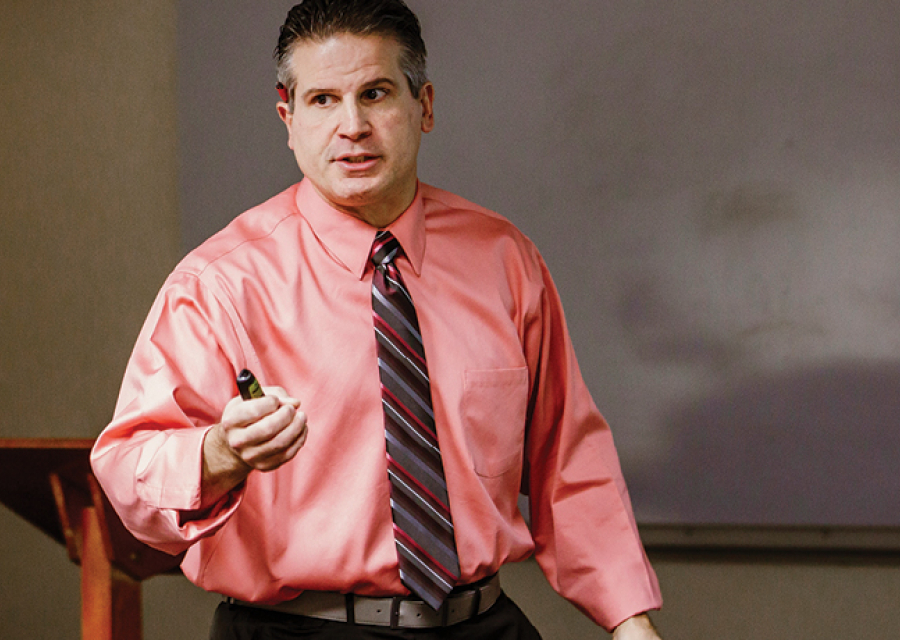
BUFFALO, NY - There’s an old saying that what can be measured is what counts. But Clancy M. Seymour ’97, MSEd ’99, EdD, maintains not everything that counts can be measured.
He’s referring to the predicament faced by today’s physical educators who, in an era of educational reform, are being evaluated on the cognitive outcomes of their students – not the physical. The implication, Seymour says, is that “the ‘physical’ is increasingly being taken out of physical education (PE).”
Seymour is director of the physical and health education teacher education (P/HETE) program at Canisius and devotes his research agenda to educational policy and its potential effects on K-12 physical education.* He most recently co-authored a revealing study that examines school district practices and attitudes concerning New York State’s new teacher evaluation policy called the Annual Professional Performance Review (APPR)**.
Under APPR, PE teachers are now evaluated on the same set of student achievement data as their colleagues who teach in such core subjects as English Language Arts (ELA) and mathematics. Physical educators were previously assessed on their ability to provide a stimulating, motivating and engaging learning environment for students. The challenge this poses, says Seymour, “is how best to assess students’ cognitive growth in PE.”
As school districts grapple for a universal answer, some have resolved to alter the curriculum.
According to Seymour’s study, 70 percent of polled physical educators are integrating more mathematics and ELA instruction into their classes to comply with the APPR mandate. The same percentage of physical educators (70%) reported increases in the use of written tests to measure student growth in PE. That’s in contrast to traditional performance-based student assessments which, absent of APPR, would be preferred by 94 percent of surveyed participants.
Further research by Seymour and a cohort of Canisius investigators examines the influence of another recent educational policy initiative on K-12 PE programs - the Common Core State Standards (CCSS).*** The study’s findings reveal that the mandatory integration of CCSS by physical educators negatively affects physical activity rates in PE class: Students were shown to be less active and reported learning and being challenged less – physically and mentally.
“Intentionally or unintentionally, educational reform policies are squeezing time away from students’ physical activity and altering the unique purpose of physical education, which is to promote the physical,” Seymour explains. “We’ve lost sight of the fact that physical activity itself stimulates a healthy body and mind which in turn creates the optimal conditions for educational success.”
The risks are even greater for the less fortunate.
“There are families who can’t afford to register their children for sports outside of school so the only opportunity their children have to be active is during the school day. The ramifications of this will play out in our healthcare system.”
Not all is so foreboding.
Despite reform policies that emphasize cognitive outcomes, physical educators remain committed to teaching the social aspects of sport.
“The physical educators we polled continue to teach children the importance of being respectful winners and losers, and positive team players,” Seymour continues.
While the dynamics of educational reform and its influence on PE play out at state and federal levels, Seymour is optimistic that insight from his team’s research can contribute to a winning solution for policy makers, educators and students alike.
“Much like plants need water, sunlight and soil to grow, children need ELA and mathematics as much as PE, music and art if they are to reach their full potentials,” Seymour states. “The soil doesn’t have to be measured the same way as the sunlight, but all are equally valuable in the growth of the plant.”
*Is the Physical Being Taken Out of Physical Education?
Co-authored with Mark J. Garrison, PhD, Director, Educational Leadership Doctoral Program, D’Youville College
**What They Think About How They Are Evaluated: Perspectives of New York State Physical Educators on Teacher Evaluation Policy
Co-authored with Mark J. Garrison, PhD, Director, Educational Leadership Doctoral Program, D’Youville College
*** Effects of Common Core State Standards on Student Physical Activity Rates and Student and Teacher Perceptions in Physical Education
Co-authored with Canisius researchers James P. Donnelly, PhD; Karl Kozlowski, PhD; Marcus Thomeer, PhD; Christopher Lopata, PsyD; and alumnus Kiel Illg ‘07, PhD



